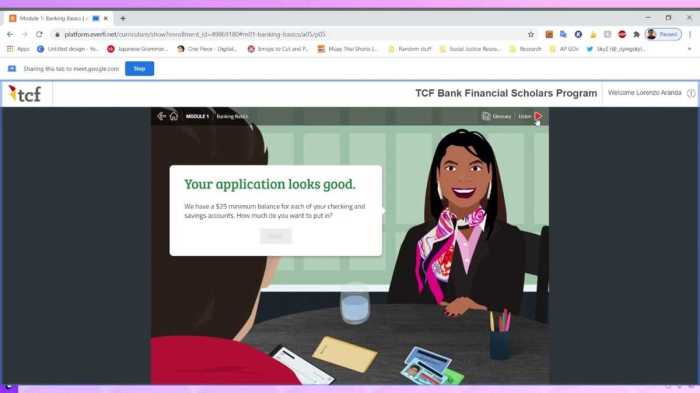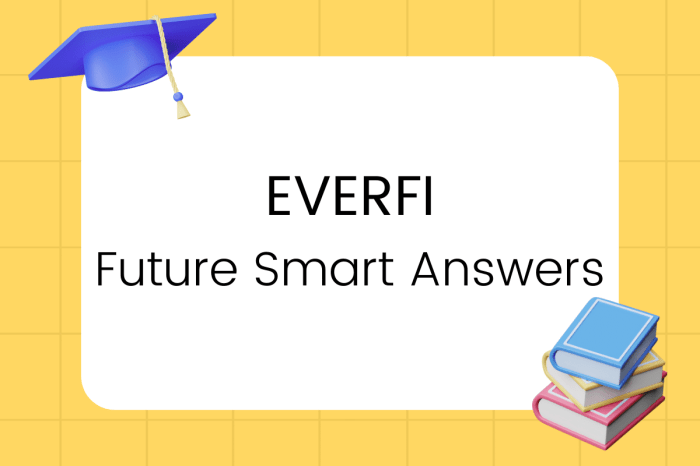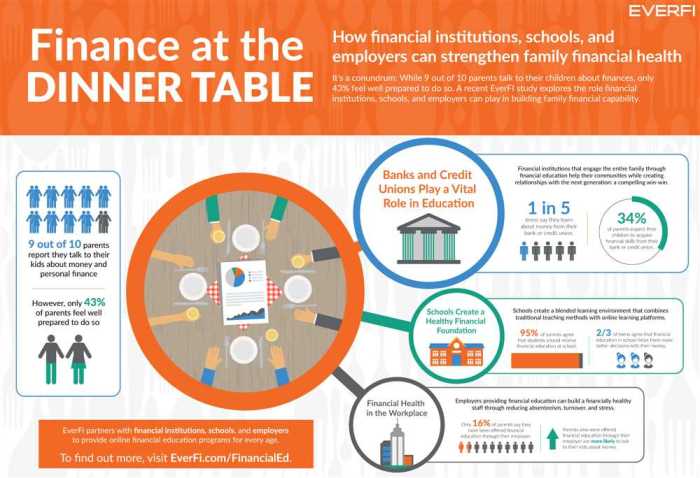Embarking on a journey through EverFi Future Smart Answers Module 4, we delve into the multifaceted world of digital citizenship, equipping individuals with the knowledge and skills to navigate the digital landscape responsibly and effectively.
This module serves as a comprehensive guide to navigating the complexities of social media, fostering responsible digital citizenship, and developing essential future-ready skills. As we traverse this digital terrain, we uncover the intricacies of media literacy, empowering individuals to critically evaluate media messages and combat misinformation.
EverFi Future Smart Module 4 Overview

Module 4 of EverFi’s Future Smart program focuses on the importance of planning for the future and making responsible financial decisions.
This module covers key concepts such as budgeting, saving, and investing, as well as the importance of building credit and managing debt.
Budgeting
Budgeting is an essential part of financial planning. It helps individuals track their income and expenses, identify areas where they can save money, and make informed decisions about how to allocate their financial resources.
Saving
Saving is an important habit that can help individuals build financial security and achieve their long-term goals. Module 4 provides strategies for saving money, including setting financial goals, creating a savings plan, and taking advantage of compound interest.
Investing
Investing is a way to grow wealth over time. Module 4 introduces the basics of investing, including different types of investments, the importance of diversification, and the role of risk tolerance in investment decisions.
Credit and Debt, Everfi future smart answers module 4
Building credit is important for accessing loans and other financial products. Module 4 covers the basics of credit scores, how to build good credit, and the importance of managing debt responsibly.
Responsible Social Media Use

In the digital age, social media has become an integral part of our lives. While it offers numerous benefits, it also comes with potential pitfalls and risks. Responsible social media use is crucial to maintain a positive and respectful online presence and protect oneself from potential harm.
One of the most significant risks associated with social media is the spread of misinformation and disinformation. With the ease of sharing content, it can be challenging to discern the truth from falsehoods. It is essential to critically evaluate the information we encounter online, verify its credibility, and avoid perpetuating false or misleading claims.
Common Pitfalls and Risks
- Cyberbullying:The use of electronic devices to bully or harass others.
- Online Predators:Individuals who use social media to target and exploit vulnerable users, particularly children.
- Identity Theft:Sharing personal information on social media can increase the risk of identity theft, where criminals use stolen information to commit fraud or other crimes.
- Privacy Concerns:Social media platforms collect vast amounts of user data, which can be used for targeted advertising or shared with third parties without consent.
Strategies for Maintaining a Positive and Respectful Online Presence
- Be mindful of your content:Consider the potential impact of your posts and avoid sharing anything that could be offensive, harmful, or illegal.
- Protect your privacy:Adjust your privacy settings to control who can see your posts and personal information.
- Respect others’ opinions:Engage in respectful discussions, even if you disagree with someone’s views. Avoid personal attacks or inflammatory language.
- Report inappropriate behavior:If you encounter cyberbullying, online predators, or other harmful content, report it to the platform and seek help from trusted adults or authorities.
By following these strategies, we can promote responsible social media use, create a positive and respectful online environment, and protect ourselves and others from potential risks.
Digital Citizenship

Digital citizenship refers to the responsible use of technology and the internet. It encompasses the rights and responsibilities of individuals in the digital world, including ethical behavior, respect for others, and the protection of personal information.
Key principles of digital citizenship include:
- Respect for others:Treating others online as you would in person, respecting their privacy and opinions.
- Responsibility:Being accountable for your online actions and the consequences they may have on others.
- Education:Continuously learning about digital technologies and their impact on society.
- Participation:Actively engaging in online communities and using technology to make a positive contribution.
Rights and Responsibilities of Digital Citizens
Digital citizens have certain rights, including the right to:
- Access information and communicate freely online.
- Express themselves and share their opinions.
- Privacy and protection of their personal information.
They also have responsibilities, such as:
- Respecting the rights of others online.
- Using technology responsibly and ethically.
- Protecting their personal information and privacy.
- Being aware of the potential risks and dangers of online activity.
Ethical Implications of Online Behavior
Online behavior has ethical implications that need to be considered. These include:
- Privacy:Respecting the privacy of others and not sharing personal information without their consent.
- Cyberbullying:Using technology to harass, threaten, or embarrass others.
- Plagiarism:Using the work of others without giving proper credit.
- Copyright infringement:Using copyrighted material without permission.
- Discrimination:Treating others differently based on their race, gender, religion, or other characteristics.
Understanding and adhering to these ethical principles is essential for responsible digital citizenship.
Media Literacy

Media literacy is the ability to understand, analyze, evaluate, and create media messages. In the digital age, media literacy is more important than ever before, as we are constantly bombarded with information from a variety of sources. It is essential to be able to critically evaluate media messages to determine their credibility and accuracy.
There are a number of ways to critically evaluate media messages. One way is to consider the source of the message. Is it a credible source? Is the message biased? Another way to evaluate media messages is to consider the purpose of the message.
Is it to inform, persuade, or entertain? Finally, it is important to consider the content of the message. Is it accurate? Is it fair? Is it complete?
By critically evaluating media messages, we can avoid misinformation and disinformation. Misinformation is false or inaccurate information that is unintentionally spread. Disinformation is false or inaccurate information that is intentionally spread to deceive people. Both misinformation and disinformation can have a negative impact on our society, so it is important to be able to identify and avoid them.
Strategies for Avoiding Misinformation and Disinformation
There are a number of strategies that we can use to avoid misinformation and disinformation. One strategy is to be aware of our own biases. We all have biases, and it is important to be aware of them so that we can avoid letting them influence our judgment.
Another strategy for avoiding misinformation and disinformation is to get our news from a variety of sources. This will help us to get a more balanced view of the news and avoid being misled by any one source.
Finally, it is important to be skeptical of information that we see online. We should not believe everything that we read, and we should always try to verify information before we share it with others.
Digital Footprint

A digital footprint refers to the data and information individuals create and leave behind while using the internet and digital devices. It encompasses online activities, interactions, and communications that shape an individual’s online identity and reputation.
A digital footprint can significantly impact individuals in various ways. It can influence job prospects, social relationships, and personal safety. Potential employers may review an individual’s social media profiles to assess their character and suitability for a position. Friends and family may form opinions based on online posts and interactions, and personal information shared online can be used for identity theft or other malicious purposes.
Managing and Protecting Digital Footprint
Managing and protecting one’s digital footprint is crucial for maintaining a positive online reputation and safeguarding personal information. Several strategies can be employed to achieve this:
- Be mindful of online activity:Consider the potential consequences of posting or sharing information online. Avoid sharing sensitive or personal data, such as financial details, addresses, or phone numbers.
- Review privacy settings:Regularly review and adjust privacy settings on social media platforms and other online accounts to control who can access and share your information.
- Use strong passwords:Create strong and unique passwords for all online accounts to prevent unauthorized access.
- Be cautious of phishing scams:Avoid clicking on suspicious links or opening attachments from unknown senders, as they may contain malware that can compromise your devices and personal information.
- Use privacy-enhancing tools:Consider using privacy-enhancing tools, such as browser extensions or VPNs, to protect your online activity and data.
Maintaining a Positive Online Reputation
Maintaining a positive online reputation is essential for individuals seeking to present themselves in a professional and trustworthy manner. Tips for achieving this include:
- Create a professional online presence:Establish a professional online presence by creating a personal website or LinkedIn profile that showcases your skills and experience.
- Be positive and respectful:Engage in positive and respectful online interactions. Avoid posting negative or inflammatory content that could damage your reputation.
- Share valuable content:Share valuable content that is relevant to your interests and expertise. This can help establish you as a thought leader in your field.
- Monitor your online presence:Regularly monitor your online presence to identify and address any negative or inaccurate information that may be circulating.
- Seek professional help if needed:If you encounter significant issues with your digital footprint or online reputation, consider seeking professional help from a reputation management specialist.
Future-Ready Skills
In the rapidly evolving digital age, individuals must possess a specific set of future-ready skills to navigate the challenges and capitalize on the opportunities presented by technology. These skills empower individuals to thrive in a world where digital literacy, critical thinking, and ethical decision-making are paramount.
Module 4 of EverFi’s Future Smart program focuses on equipping students with these essential future-ready skills. By developing these skills, students can become confident and responsible digital citizens, capable of making informed decisions and leveraging technology for personal and professional growth.
Responsible Social Media Use
- Understand the ethical and responsible use of social media.
- Recognize the potential risks and benefits associated with social media.
- Develop strategies for managing their online presence and reputation.
Digital Citizenship
- Comprehend the rights and responsibilities of being a digital citizen.
- Understand the impact of their online actions on themselves and others.
- Demonstrate respectful and responsible behavior in digital spaces.
Media Literacy
- Evaluate the credibility and reliability of information sources.
- Identify and analyze different types of media.
- Develop critical thinking skills to discern fact from fiction.
Digital Footprint
- Understand the concept of a digital footprint.
- Recognize the potential consequences of their online actions.
- Develop strategies for managing their digital footprint.
Question & Answer Hub: Everfi Future Smart Answers Module 4
What is the primary focus of EverFi Future Smart Answers Module 4?
EverFi Future Smart Answers Module 4 centers around developing digital literacy and responsibility, empowering individuals to navigate the digital landscape with confidence and ethical awareness.
How does the module promote responsible social media use?
The module emphasizes the importance of responsible social media use, identifying common pitfalls and risks associated with social media platforms. It provides strategies for maintaining a positive and respectful online presence.
What are the key principles of digital citizenship covered in the module?
EverFi Future Smart Answers Module 4 defines digital citizenship and its key principles, outlining the rights and responsibilities of digital citizens. It explores the ethical implications of online behavior and promotes responsible digital engagement.
Why is media literacy essential in the digital age?
The module highlights the significance of media literacy, providing examples of how to critically evaluate media messages. It discusses strategies for avoiding misinformation and disinformation, empowering individuals to make informed decisions based on credible information.
How does the module help individuals manage their digital footprint?
EverFi Future Smart Answers Module 4 explains the concept of a digital footprint and its potential impact on individuals. It provides strategies for managing and protecting one’s digital footprint, including tips for maintaining a positive online reputation.